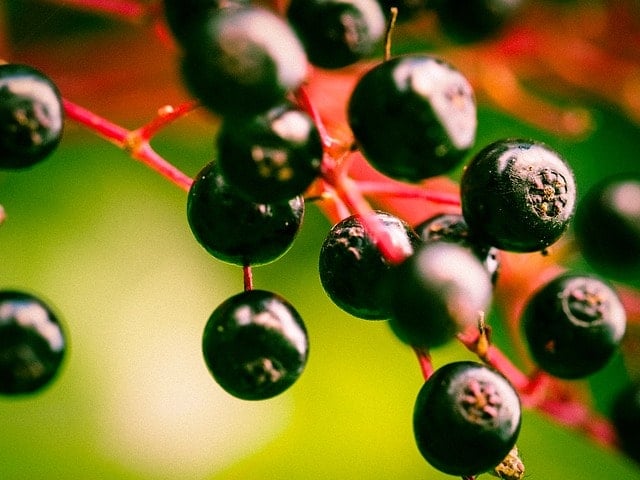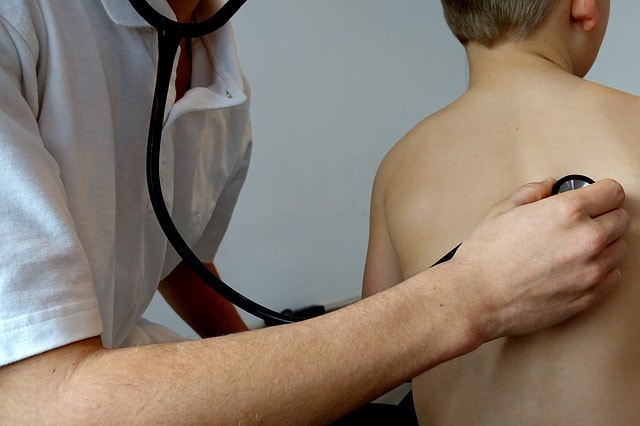Introduction
I recently travelled around Dublin looking for organic, non-alcoholic wine. Reason being that I wanted the health benefits of red wine without the alcohol. At the get-go, I suspected that Dublin may not be the best place to look for non-alcoholic wine. I was right.
Having announced my intent, shop assistants looked at me with a mixture of shock, amusement and bewilderment. One shop assistant checked around for a hidden camera assuming that she was being pranked.
Finally, one wine connoisseur told me to stop wasting my time and just drink elderberry juice. He assured me that elderberry had the same type of phytonutrient laden skin as grapes and that I could do a legitimate ‘drink’ swap. I wonder?
What Is Elderberry?

Sambucus or the elderberry tree grows up to 30 feet tall. It has deciduous leaves, white flowers and dark red-blue-viloet berries. The dark color of the berries is due to the presence of phenolic anthocyanins.
Elderberries contain:
- vitamins (A, B1, B2, B6, B9, C and E)
- trace elements (copper, zinc and iron)
- minerals (potassium, calcium, magnesium)
- falvanoids (quercetinquercetin and kaempferol)
- carotenoids
- phytosterols and
- proteins (type 1 and 2 ribosome inactivating proteins and hololectins).
The taxonomy of elderberry is super complicated as it is geographically widespread and morphologically complex. The number of recognized species has been revised and reduced down from over 30 to 9.
Five taxa formerly considered to be distinct species (S canadensis eastern North America and central America, S cerulea blue elder western America, S peruviane South America, S maderensis old world island taxa, S palmensis old world island taxa) have now been encompassed onto the nigra species. However, this is controversial in some circles. Apparently taxonomy experts are divided into ‘lumpers’ and ‘splitters’ on the subject and can argue about this till the wee hours.
Seeds and charcoals of the Sambucus species dates back to the copper age.
Hippocrates called the elder tree his ‘medicine chest’ way back in 400 BC. It is used for toothaches, wounds, burns, arthritis, worms, dyssentry, fever and epilepsy in indigenous medicine.
In Celtic traditions (my part of the world) the eldertree or ‘ruis’ has strong links with the winter solstice and the fairy world. I have plenty of friends (regular logical linear folks) who open a bottle of elderflower cordial during the winter solstice for no apparent reason.
Sambucus is also used in veterinary medicine.
The usual recommended dose of elderberry ranges from 650 mg to 1500mg daily.
Elderberry and elderflower products come as teas, cordials, lozenges, lemonades,syrups, capsules, extracts, presse and even liquer. There are 531 elderberry of elderflower related products for sale on Amazon. You can spend up to $85 on an elderflower syrup.
Can You Get Elderberry From Food?
The use of elderberry as a food has been restricted by the presence of low molecular weight bioactive compounds that are poisonous. Raw or unripe fruits contain a cyanide like structure that is poisonous. Oops.
Fortunately, elderberries can be safely consumed once processed. However variations in the content of processed elderberries can vary.
Missouri based researchers evaluated the effects of frozen storage on the anthocyanin and polyphenol content of elderberry fruit juices (1). Funded by the National Institutes for Health, juice samples were tested upon harvest and then 3, 6 and 9 months after frozen storage.
Three different genotypes of American elderberry (Adams II, Bob Gordan and Wyldewood were tested). The elderberries were grown at the University of Missouri. Analysis of total phenolic content was conducted at the Department of Chemistry, Missouri.
There was a statistically significant difference in the levels of anthocyanin among the three genotypes of elderflower studied. Additionally, the levels of the measured constituents significantly decreased over time.
Is There Any Research?
The search term elderflower brings up 15 results on Pubmed and no clinical trials. Elderberry yields 119 searches and 24 clinical trials. There are 1041 results for Sambucus on Pubmed. These 1041 publications include 22 clinical trials.
To put this into context, echinacea (which is often co-administered with elderberry) has 1134 publications but has 86 clinical trials.
A comprehensive evidence based systematic review of elderberry was published by the Natural Standard Research Collaboration in the Journal of Dietary Supplements in 2014 and we will discuss the findings in the following sections (2).
Does Elderberry Aid Digestion?
The only relevant study connecting Sambucus to digestion relates to the bowel. Sambucus may have laxative properties. A combination of Pimpinella anisum L (green anise), Foeniculum vulgar Miller (fennel) and Sambucus has been commercially available in Brazil since 1926 for the management of constipation.
A cross-over study of 20 patients with chronic constipation compared the Brazilian herbal mixture with placebo in a cross-over design (5 days of one intervention, 9 days of wash-out and 5 days of the alternative intervention) (3).
The study used subjective and objective measures of bowel transit time. Subjective measures involved a validated questionnaire. Objective measures involved radiologically following 20 radio-opaque markers.
There was a statistically significant increase in colonic transit time and number of evacuations per day during treatment with the herbal agent. However, there was no significant improvement in quality of life noted.
So, this combination may have a laxative effect. However, it is impossible to say that this laxative effect was due to Sambucus alone or the other agents or synergy among the herbal constituents.
Bottom line
Very best case scenario (and being very generous with my interpretation of the literature) Sambucus may exert a laxative effect but this does not translate into a better quality of life. This hardly qualifies Sambucus as a digestive aid.
Does It Improve Cardiovascular Health?

A total of 40 healthy subjects (50 to 70 years old) were given a berry beverage containing:
150 gm blueberries
50 gm elderberries
50 gm lingonberries
50 gm strawberries
100 gm tomatoes
or a control in a 5 week randomized control cross over study (4). (I am really paying attention as this speaks to the possibility of substituting Sambucus for red wine).
Cognitive function and cardiometabolic parameters were assessed. Cardiometabolic metrics measured included BP, fasting blood sugar, insulin, lipids and oxidative stress.
There was a statistically significant reduction in cholesterol in the berry treatment group when compared to baseline and when compared to the controls. The berry mixture did not affect fasting glucose and resulted in a non-significant reduction in fasting insulin. No significant difference was noted in the other variables measured in the study. A modest (5%) but significant increase in working memory was noted in the berry group.
This study is small and short-term. Additionally it is impossible to isolate out the effect of elderberry versus the other berries. The 2014 systematic review mentioned above also reached a similar conclusion (2). The reviewers graded the data on cardiovascular disease as 'Level C evidence' which corresponds with unclear or conflicting scientific evidence.
Bottom line
There is no clear evidence linking elderberries to cardiac health. It certainly cannot compare to red wine.
Does It Improve Respiratory Health?

The research in this area focuses on the role of elderberry as an anti-viral agent.
A leading researcher in this field is Israeli investigator, Madeleine Mumcuoglu MD. She explains that elderberry neutralizes the activity of hemagluttin spikes on the surface of some viruses’.When the hemagluttin spikes are deactivated, the virus can no longer pierce the cell walls or enter the cell wall to replicate’.
An Israeli-Norwegian-Swedish collaboration evaluated the safety and efficacy of oral elderberry for the treatment of influenza A and B. A total of 60 adults suffering from laboratory proven influenza were enrolled in a double blind placebo control study (5). Study participants received 15 mL of elderberry (with raspberry, glucose, honey and citric acid) or placebo four times daily for 5 days.
The study noted that elderberry was associated with 4 less days of symptoms and a significantly lower rate of use of rescue mediations compared to controls. The authors specifically comment on the fact that the patients in this study were otherwise healthy and as such are not representative of patients who are at high risk of influenza.
The elderberry was well tolerated in the study. As sedation is the main side effect of standard anti-influenza medication, study participants were specifically asked about sedation during the study but none of the patients complained of sedation.
A second study was done by a group of Australian researchers and looked at the role of elderberry supplementation in air travellers (6). Air travel (as you may well know from firsthand experience) is associated with respiratory symptoms believed to be due to a long shopping list of possibilities including impaired immunity, nasal dryness and cabin spread of airborne viruses.
This was a randomised controlled trial in 312 economy class passengers travelling to overseas destinations at least 7 hours away. Participants were randomized to either filtered elderberry or placebo. Study participants were recruited via travel agencies, radio, TV and newspapers from a university on the Gold Coast of Australia.
The study was funded be Ipona, Italy who are the manufacturers of the brand of elderberry used in the study.
The placebo was identical in terms of size, excipients and appearance. Travellers took a loading dose of elderberry (2 x 300mg capsules) or placebo from ten days prior to travel to two days prior to travel.
They then took elderberry (1 x 300mg capsule) from the day prior to travel to 5 days post arrival. As an interesting aside (or at least I think so), the majority of the study participants reported feeling stressed prior to travel. Following air travel both groups had a significant increase in respiratory symptoms.
The elderberry group had a statistically lower number of cold episode days and statistically significantly less severe symptoms. However this was not reflected in an increase in use of flu or cold remedies in the placebo arm.
Finally, a randomized, double-blind, double-dummy trial compared echinacea plus Sambucus versus Tamiflu in 473 patients with early influenza (7). Early influenza was defined as influenza symptoms of less than 48 hours.
Patients were given either 5 days of Tamiflu followed by 5 days of placebo or 10 days of echinacea plus Sambucus.
Recovery from the flu was comparable in the two groups. The echinacea plus Sambucus group had less influenza related complications and fewer adverse events. The key limitation of the study related to the fact that the statistical analysis used ‘on treatment analysis’ and not ‘intent-to-treat’. This meant that data from only 420 out of 473 patients were analyzed.
Patients not included in the study analysis were:
- lost to follow up 7
- protocol violations 28
- non-complaint 17
- took other non-approved medication 1.
This is such a pity as these ‘silent’ patients can give us a wealth of information about the real world use of these agents. The issue of the statistical analysis is compounded by the fact that the study was sponsored by a leading manufacturer of the herbal product.
Credibility is always an issue when it comes to studies sponsored by manufacturers. That’s just how it is. In many ways, the smart thing to do would have been to stick to the gold standard at every step in the study to silence sceptics like me. This was not done and I am suspicious.
Again the 2014 review graded the data on bronchitis and sinusitis as 'Level C evidence' which corresponds with 'unclear or conflicting scientific evidence' and rated the data on influenza as 'Level B evidence' which corresponds to 'good scientific evidence' (2).
Bottom line
I think that I will give the final world on the bottom line on this to the leading textbook on Integrative Medicine by David Rakel says ‘ with only one small clinical trial [at that time] and no good safety data, the use of elderberry for the treatment of upper respiratory tract infections is intriguing but unlikely to become widely adopted’ (8).
Does it Boost Immunity?

A 2001 publication studied three different formulations of Sambucus on immune function (9). The three formulations used contained:
- elderflower
- elderflower plus echinacea, propolis, zinc, vitamin C
- low dose elderflower (for kids) plus echinacea, propolis and raspberry.
The formulations were tested in mononuclear cells taken from 12 healthy consenting volunteers.
All three formulations significantly increased production the inflammatory cytokines IL-6, IL-8 and TNF-alpha. With the exception of IL-8, the immunomodulation was dose dependent. Unfortunately, this single small in vitro study is insufficient to answer the question of whether Sambucus improves immunity.
Problems with the study include the divide between in vitro and in vivo world and the differences between healthy volunteers and general population.
Bottom line
There is insufficient information to comment on the role of Sambucus as an immuno-modulator.
Does It Help with Diabetes?
A study of 12 plants in streptozocin induced diabetic mice found that elderberry did not significantly effect parameters of glucose homeostasis (basal glucose, insulin, insulin induced hypoglycemia, glycated haemoglobin or pancreatic insulin concentration unlike guavas and Agarics bistro mushrooms. (10).
Researchers from the North of Ireland showed the presence of insulin-releasing and insulin-like activity in the traditional antidiabetic plant, Sambucus nigra in mice cell cultures (11).
Norwegian investigators showed enhanced glucose and oleic acid uptake in human skeletal muscle cells after treatment with phenolic elderberry extracts, anthocyanins, procyanidins, and their metabolites (12).
However this does not translate into improved sugar control in the real world.
The only clinical study looking at Sambucus and glucose control (mentioned above) failed to show any benefit of Sambucus on a wide range of parameters of glucose metabolism. This study did not specifically look at diabetic patients but this is all we have to go on at this time.
Bottom line
There is no proof that Sambucus can benefit people with diabetes.
Does It Improve Bone Health?

There are no clinical trials looking a Sambucus in bone health.
Romanian investigators used streptozocin to induce hyperglycemia in 48 male rats. (13)
They then evaluated the anti-osteoporotic effect of Sambucus on these rats. The rats had DEXA scans to determine their bone mineral density (my first time hearing of rats having DEXA scans).
Sambucus had a significant effect on bone mineral density specifically on the dorsal spine, cervical spine and femur.
Bottom line
An absence of human clinical data makes it impossible to recommend Sambucus for bone health at this time (but if your pet rat is underweight, smokes, drinks and live.s in Sweden I would definitely recommend it)
Is it good for your skin?

There are no human clinical trials looking at Sambucus in dermatology.
The only relevant study comes form a group of Romanian investigators (14). They identified five cyanidin based anthocyanin in elderberries (cy-3-0 samb was the most abundant). They then showed that the anthocyanin enriched content of elderflower inhibited metastatic murine melanoma cells via apoptosis (cell death) in vitro.
The authors concluded that elderflower might be beneficial as adjunctive topical therapy of skin cancers. The noted that topical therapy comes with the advantage of allowing a higher dose of elderberry to reach the target site. They also comment that cy-3-0-samb may not be responsible for the observed therapeutic effect as it is impossible to isolate out the role of cofounders such as phenols or flavanols.
Bottom line
There is nothing to recommend elderberry for skin health.
Is it good for weight loss?
A single German study looked at the effect of Sambucus nigra L. berry juice and tablets plus the Asparagus officinalis L. powder tablets in eighty subjects (15). The investigators were exploring the effect of the combination as a ‘starter for lifestyle change’ (which is an interesting concept in itself).
After the diet, the mean weight, blood pressure, physical and emotional well-being and the quality of life had significantly improved on an intent-to-treat analysis.
Bottom line
One short term clinical study shows beneficial effects of Sambucus in terms of weight loss.
Is Elderberry (and or Supplementation) Safe?
Elderberry is ‘generally regarded as safe’. That is if you take the right type of elderberry.
- It is essential to avoid dwarf elder (Sambucus elder) which can be toxic, As mentioned above, raw or unripe fruits contain a chemical related to cyanide which is highly toxic.
- It is recommended that elderberry be avoided by pregnant or breastfeeding women.
- It is also recommended that elderberry be avoided in people with autoimmune disorders because of a theoretical risk of immune-stimulation.
- Elderberry may theoretically lower blood sugar and is best avoided by people taking medication for diabetes.
- It has also has some diuretic properties and should be avoided by people taking diuretics (water pills) or people taking other herbal products with diuretic properties e.g. dandelion.
- Elderberry may reduce the blood levels of the anti-asthma drug theophylline and is best avoided in asthmatics taking this medication.
Conclusion
Sambucus cannot substitute for health benefits of red wine. Period. I have no problems with any of my friends who like to open a bottle of elderflower cordial at the winter solstice. You may find that odd as I am otherwise an academic sceptic. I think rituals are fun and don’t need a Cochrane review to justify them. (My kids have birthday parties and there is no science to back that up).
However, it is entirely different to suggest that elderberries have medicinal benefits. That just makes me mad. I hate to see hard-working people waste money on false marketing which is so prevalent in the field of herbal medicine. It is not only wrong. It is downright dangerous. False belief in Sambucus has an opportunity cost and stops people from availing of proven treatments.
Unlike Hippocrates, we are not living BC. I don’t think for one moment that Hippocrates would still be hugging elder trees if he were alive today.

Leave a Reply